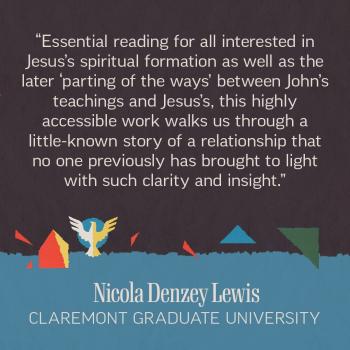I’ve been looking forward to blogging about Crispin Fletcher-Louis’ book Jesus Monotheism: Volume One – Christological Origins: The Emerging Consensus and Beyond. Having finished reading it as I prepared my paper for the Enoch Seminar meeting about John’s Christology in Italy this month, the time has finally come.
First, let me say that I appreciate Crispin’s interaction with my own work, and his efforts to engage both those he largely agrees with, and those with whom he largely disagrees, in a manner that is fair, appreciative, and critical. I also appreciate his insightful recognition of a number of the most crucial issues, and his exploration of unconventional proposals in his effort to address them.
As the title indicates, this book is the first in a series exploring the subject of Christology in relation to monotheism. Although Crispin adopts a more positive view of Bauckham’s terminology of “divine identity” than I have tended to, he rightly highlights that the evidence shows – and shows quite unambiguously – that (contrary to Bauckham) divine identity is something that Jews believed that God could share with others. He and I agree that the lack of evidence of controversy about the status of the Messiah per se between Christians and other Jews is a very important datum (see e.g. pp.314-315).
Where we disagree are for the most part on very specific details of interpretation. For instance, Crispin finds it unlikely that Paul, in Philippians 2:6-11, viewed Jesus as having received the divine name YHWH-Kyrios for the first time at his exaltation, and having become worthy of worship at that point (pp.70-71). While Crispin claims that it is the pre-existent divine status of Jesus that is the basis of worship, I find this to not be what the text says. In the first part of the hymn, there is no indication that Christ is worshiped at all, much less in the kind of universal acclamation and recognition of lordship depicted towards the end of the passage.
One particularly persuasive point, as it relates to the theme of Jewish messianism, is his highlighting of the fact that Jesus alone among Jewish messianic claimants, as far as we know from the available evidence, had the claim made that he played a mediatorial role in creation (e.g. pp.143-145). This deserves significant renewed attention, and I will need to make this a focus of reflection myself as I turn my attention once again to Christology and monotheism in my research in the coming months and years.
If there is a point that I feel particularly needs to be addressed in his future publications, it is the sense I get that Crispin is both trying to say that Jesus was eternally included in the divine identity, and that it is relevant to early Christology that God is free to deify others and share the divine identity (p.307).
For anyone interested in this field, Crispin’s book is essential reading, as he offers proposals that are distinctive and insightful, and which it is crucial to consider, regardless of whether in the end you find yourself persuaded by a given argument or not.
I’m hoping that Crispin and I will have the opportunity to talk more about our points of agreement and disagreement at the upcoming Enoch Seminar. There we’ll also undoubtedly discuss the work of other scholars who also blog, such as Larry Hurtado, Brant Pitre, and David Capes. The latter recently posted links to videos of lectures he gave on kyrios (lord) as a Christological title, YHWH texts in Paul’s Christology, and Pauline exegesis and the divine Christ. And so I thought I should share them here too.














